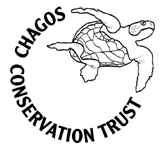|
|||||||||||||||||||||||||||||||||||||||||||||||||||||||||
|
The Chagos Conservation Trust is a charitable association, established in 1992, whose aims are to promote conservation, scientific and historical research, and to advance education concerning the Chagos Archipelago, including Diego Garcia, the largest island. It is a non political association. The Chagos Archipelago is an isolated group of atolls and reefs in the Central Indian Ocean. The group forms the southern end of the Laccadives - Maldives - Chagos atoll chain, and is centred at about 6° South, 72° East, roughly 2,000 miles east of Africa and 2,000 miles west of Singapore. There are five atolls, ten reefs and submerged shoals and 55 islands. One of the atolls, the Great Chagos Bank, is the largest atoll in the Indian Ocean. The Chagos Islands have belonged to Britain since 1814 and were constituted as the British Indian Ocean Territory (BIOT), in 1965. Since 1966 BIOT has been reserved for the defence purposes of Britain and the United States. The isolation of the Chagos, far from maritime trade routes, and restrictions on access to the islands means that they and the adjoining reef areas enjoy an exceptionally pure environment, free from the contamination normally associated with human activity. This condition does not just result in a particularly varied and abundant marine and bird life; it also provides a standard for measuring the impact of human pressures on other reef systems. In addition, recent research is already beginning to yield important information about long term changes in sea levels and sea temperatures, and consequently, about the role which this part of the ocean plays in world weather patterns. The British Government, through the BIOT Administration, is committed to conserving the environment of the area. Clearly however, there needs to be a means of engaging non governmental interest in this remarkable treasure chest of maritime nature. This is the gap Chagos Conservation Trust exists to fill. The association aims, for example by promoting scientific expeditions to monitor the status of the marine and terrestrial environment; it provides a channel for bringing relevant environmental problems to the Government's attention; it establishes links with other groups concerned with reef ecology, particularly in relation to the Indian Ocean; it encourages research into the history of the Chagos Archipelago; and seeks to educate and to make available the results of its work to a wider audience. To these ends the association has produced four illustrated booklets dealing with various aspects of Chagos natural history. It also publishes the Chagos News. In 2004 the Chagos Conservation Trust published "Peak of Limuria". A revised and updated edition of Richard Edis' hisory of Diego Garcia, this book gives a lively account of the nature, discovery and development of the Chagos Archipelago initially for coconut plantations, focussing particularly on Diego Garcia, which from the beginning also attracted the attention of naval powers active in the region. Touched by both World Wars, Diego Garcia's military role grew dramatically from the 1980s, following the conroversial closure of the plantations and establishment of American naval and air staging facilities. This new edition sheds fresh light on these events and explains how the base was used in recent conflicts. It concludes by describing the growing impact of climatic changes, which threaten the Archipelago's long-term habitability. The Association looks for support from all those interested. The annual membership subscription costs £10 or £50 for six years. If you would like more details of the publications available, membership, or the constitution, please contact: The Secretary, 29 Champion Hill, London SE5 8AL. |
|
||||||||||||||||||||||||||||||||||||||||||||||||||||||||
|
|||||||||||||||||||||||||||||||||||||||||||||||||||||||||
 |
 |
 |
 |
 |
 |
 |
 |













